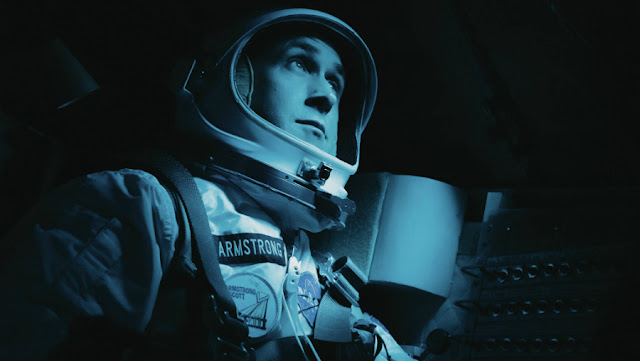 |
| Ryan Gosling in FIRST MAN (Universal (c), still photo by Daniel McFadden) |
★ ★ ★ ★ ★
Damien Chazelle makes the hat-trick with this extraordinary film that, appropriately, puts the man first. Ostensibly depicting the trials and tribulations of NASA’s Gemini and Apollo programs, First Man reveals itself to actually be about those of Neil Armstrong, in a refreshing break from space films that are less concerned - thematically, at least - with the inner workings of their central characters (Gravity is about survival, Interstellar is about time, The Martian is about collaboration, and so on).
Armstrong (Ryan Gosling) and his hopes, fears, treasures and turmoil are laid bare years before the dawn breaks on July 16th, 1969. Most are unspoken, all are devastating. The film begins with the death of his young daughter, Karen, and from there explores the near-decade Armstrong and his wife, Janet (Claire Foy) spent in the wake of that tragedy. Neil is concurrently engaged in constant danger, training for the race to reach the moon.
Far from a demonstration as the La La Land director’s new muse, First Man is the ultimate utilisation of Gosling’s best qualities as a restrained performer. His Armstrong speaks softly, withdraws from crowds, and has a crucial lack - if not active avoidance - of patriotic charisma (that cocksure role is taken up by Corey Stoll as Buzz Aldrin). Gosling says everything with a bowed head, an unfocused gaze, two fingers upon a pane of glass.
Though not explicitly stated by anyone on-screen (the 60s produced many revolutions, but open honesty about mental health wasn’t one of them), Neil’s depression is obvious to anyone who recognises that need to stay silent because admitting pain or anguish would make it real. Here’s a portrait of masculinity that flies in the face of everything one is taught from childhood of these supermen who trod amongst the stars.
Not that Armstrong is absolved entirely of blame for his continued distress. Claire Foy provides the crucial (and utterly indelible) voice of the audience as Janet, who desperately attempts to break down her husband’s emotional Faraday cage. In one of many moments of sheer heartbreak, she demands that Neil sit down and explain to their children that his small step may be a one-way trip. The boys reactions are muted, and they go off to bed almost as they would any other night, just as they returned to playing in the garden when an earlier test run briefly leaves their father spinning hopelessly above the Earth.
Because, for them, it’s impossible to truly comprehend what it means when your father tells you he might not come home. But Chazelle ensures we get the picture, with speaker-shattering launch sequences and dizzying Zero-G acrobatics that are second to none. Faces turn blue with unpreventable gasps and teeth are clenched together as though doing so will somehow hold the tenuous screws of the landing craft in place. Immaculate period detail hammers home the cramped, roughshod reality of early space travel like never before.
Production designer Nathan Crowley and special effects house Double Negative are not all that connects First Man to Interstellar (the inescapable benchmark with which all films of this kind must now compete). Justin Hurtwitz’s sonic accompaniment - by turns delicate and unnerving - follows Hans Zimmer’s lead and departs from a classical action score. The cue which heralds the climactic launch of Apollo 11 itself, however, would feel right at home amongst the late James Horner’s score for Apollo 13 (something about a soaring rocket seems to demand such a stirring piece).
Also present is the connection between a father and his unreachable daughter that forms the emotional core: one comes to realise very quickly that Armstrong’s devotion to his mission is so much more a personal quest than a political or occupational one. That this peace comes at the cost of lives, amity between nations and familial upheaval only adds to the burden of a man who just wants to escape the noise of the Earth as he does the din of a White House party.
Chazelle, Gosling and cinematographer Linus Sandgren reward him that, finally, on the largest canvas possible. Painfully intimate 16mm photography gives way to the liberating clarity of IMAX. Neil steps onto a globe all of his own. He - and the audience with him - breathes fully for the first time into a blissful silence. First Man may not end with a bang, but we certainly provide the whimper.






No comments:
Post a Comment